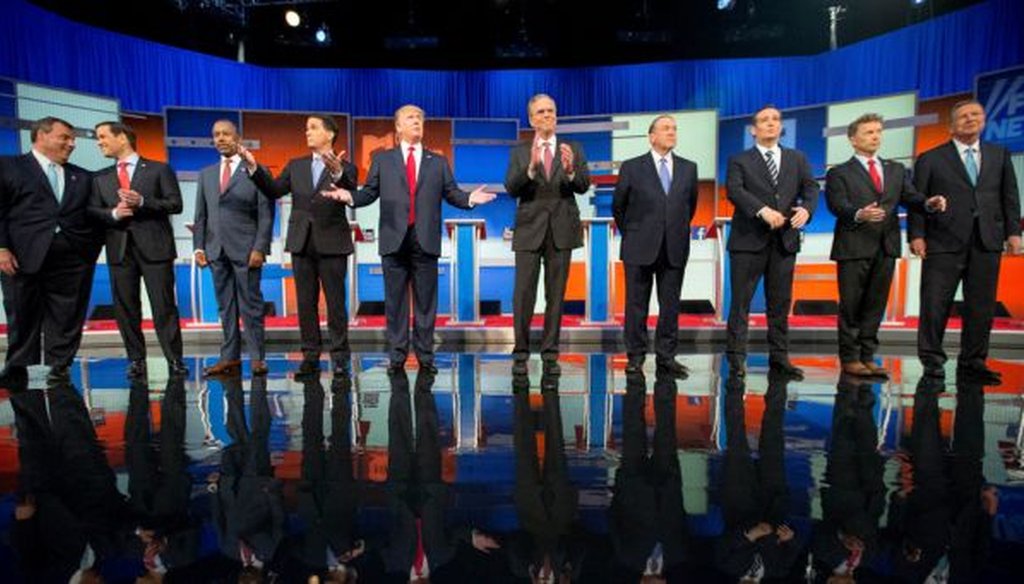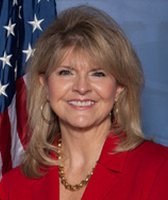Stand up for the facts!
Our only agenda is to publish the truth so you can be an informed participant in democracy.
We need your help.
I would like to contribute

Republican presidential candidates from left, Chris Christie, Marco Rubio, Ben Carson, Scott Walker, Donald Trump, Jeb Bush, Mike Huckabee, Ted Cruz, Rand Paul, and John Kasich at the first Republican presidential debate in Cleveland on Aug. 6, 2015. (AP)
You don’t have to strain to hear the sweet, sweet sounds of the 2016 presidential election cycle. With less than six months to go before the Iowa caucuses, the TV is blaring with analysis from pundits assessing every small twist in the race.
Some of the chatter is purely biographical, hitting on accurate points about electoral trends and candidates’ pasts. Other claims have neglected context, already misleading viewers in what will be a very long race to determine our next commander in chief.
Here’s PunditFact’s early guide to sorting out the truth in the early attacks.
Hillary Clinton’s email
(Screenshot of Hannity’s show)
One of the biggest obstacles for Hillary Clinton is the drama over her use of private email account and a personal server while she serving as secretary of state.
Andrew Napolitano, a Fox News analyst, connected the emails with another controversy from Clinton’s years at the State Department: the Benghazi attack.
"I saw emails that have been revealed under the Freedom of Information Act," Napolitano said in an Aug. 5 interview with Sean Hannity. "And in them, she is discussing the location of French fighter jets during the NATO bombardment of Libya, how big the no-fly zone is, where the no-fly zones are, and are you ready for this? — the location of Ambassador Stevens, who of course was murdered, in Libya. If that is not classified — if she didn’t know that was classified, she has no business being in public office."
Napolitano’s attack rates Half True.
The messages at hand were sent before Stevens was the ambassador to Libya, and about a year and a half before the Sept. 11, 2012, attacks on the Benghazi compound that killed Stevens. At the time, Stevens was the special envoy to the Transitional National Council, the de facto Libyan government during its civil war.
State Department staffers sent Clinton emails that discussed his location in general terms, such as that he was in Malta then Benghazi, where he met with local leaders at unspecified locations, and he stayed at an unnamed hotel. Napolitano’s statement suggests that if a bad guy had gotten his hands on these emails, Stevens could have been in danger because the bad guys would know exactly where to find him. In reality, these emails don’t reveal much more than what was publicly known at the time.
Honeymoon with Bernie
A reader of George Will’s columns in the Washington Post asked us to confirm whether it was really true that, as Will recently wrote, Democratic presidential candidate Bernie Sanders honeymooned in the Soviet Union in 1988.
We rated the claim Mostly True.
Basically, it wasn’t a normal honeymoon. Sanders was mayor of a progressive city, Burlington, Vt., at the time, and he and wife Jane Sanders timed their wedding day with an already-scheduled sister-city trip to Yaroslavl, an historic Russian city. The Sanderses met with local officials and citizens and traveled around with about 10 people from Burlington.
"Trust me," Bernie Sanders wrote in his book. "It was a very strange honeymoon."
Trump, Trump, Trump
(New York Times photo)
Weeks before disinviting Trump to his RedState Gathering for disparaging comments about Fox host Megyn Kelly, RedState editor in chief Erick Erickson penned a column detailing Trump’s flip-flops on significant issues over the years.
Trump has given money to Democrats, including Hillary Clinton, and he has supported abortion rights. And "he has supported a Canadian-style universal health care system," Erickson wrote.
Erickson’s claim rates True.
The billionaire’s 2000 book The America We Deserve makes a strong pitch for universal health care.
"I’m a conservative on most issues but a liberal on this one," Trump wrote. "We should not hear so many stories of families ruined by health care expenses. We must not allow citizens with medical problems to go untreated because of financial problems or red tape."
Trump’s current position on single-payer is more murky, and his campaign has not released his detailed position on health care.
Republicans and women
After the debut GOP debate, Trump went after Kelly for asking him about his past insults toward women — which definitely happened, even though he said he didn’t say them.
Pundits on Meet the Press debated whether his Kelly tirade would drive away women not just from Trump, but from the GOP. Heather McGhee, president of liberal economics group Demos, pointed out that Republicans have had a hard time with that demographic over the years.
"I think it’s important to remember the Republican presidential nominee hasn’t won women since 1988, so this is a very deep problem for the party," McGhee said Aug. 9, 2015. "It’s not going to be enough for anyone, a commentator or one of the candidates, to just disavow Trump’s sort of interpersonal sexist comments."
Her claim about the Republicans’ dry spell with women rates True.
In 1988, Republican nominee George H.W. Bush received a single percentage point more of female votes (at 50 percent) than Democratic presidential candidate Michael Dukakis, according to research by the Center for American Women and Politics at Rutgers University. Since then, no GOP candidate has "won" the women’s vote.
Our Sources
See fact-checks.








































